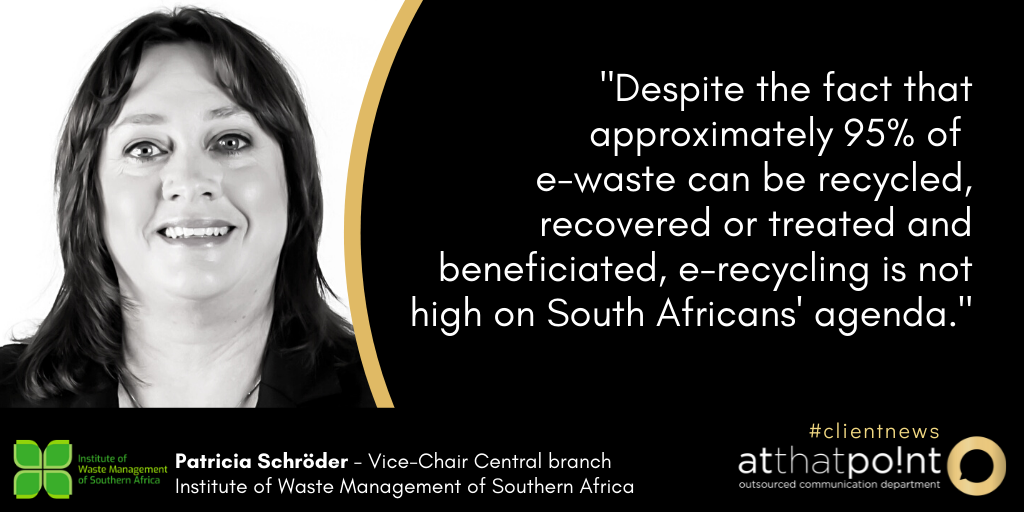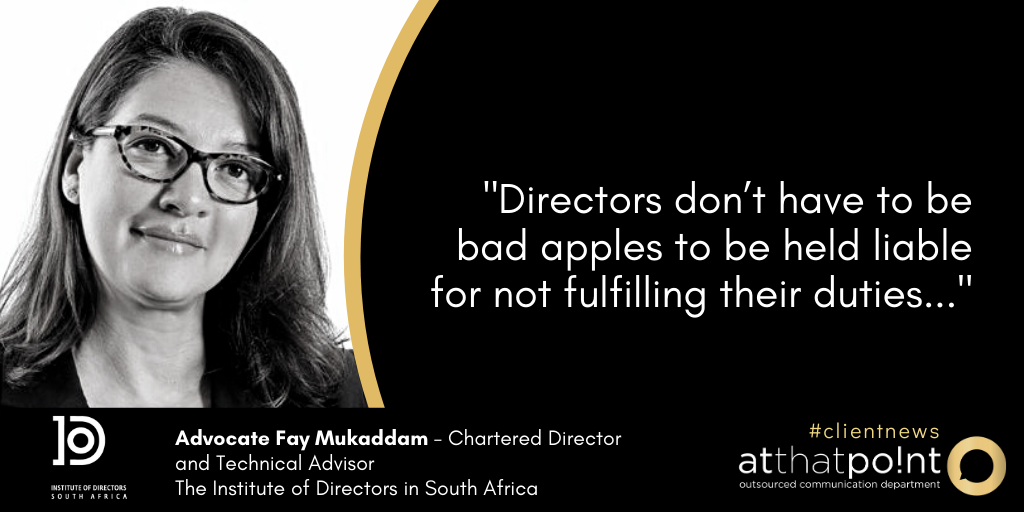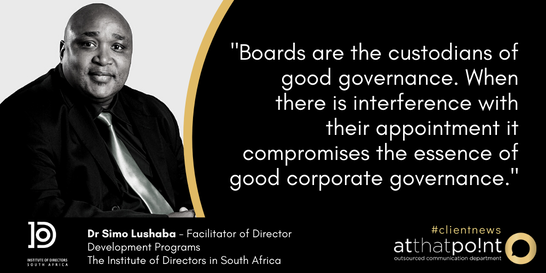|
As long as Government’s cadre deployment policy is defended, governance of South Africa’s state- owned entities (SOEs) will remain vulnerable and at risk, says Dr Simo Lushaba, Facilitator of Director Programs at the Institute of Directors in South Africa (IoDSA).
He was reacting to the testimony of President Cyril Ramaphosa before the Zondo Commission of Inquiry into State Capture, who acknowledged that “massive system failures” with board appointments paved the way for SOE failures. At the same time, the President defended cadre deployment. Lushaba says boards are the custodians of good governance. When there is interference with their appointment it compromises the essence of good corporate governance. According to King IVs sector supplement for SOEs, the composition of its board is a key factor driving the performance of an SOE. Like the boards of all organisations, an SOE’s board must have the right balance of knowledge, skills, experience, diversity and independence for it to discharge its governance role and responsibilities objectively and effectively. The deployment committee, which the President described as overseeing board appointments to SOEs, should thus have been mandated to recommend people who were fit for purpose to be appointed to SOE boards. By-passing the deployment committee In addition, some of the SOE board member appointments, now being questioned before the Zondo Commission for their role in state capture, actually bypassed the oversight role of the deployment committee. “The question then is what did the committee do about it. It clearly shows that it is a system that lacks accountability”. If any individual can bypass a committee of this nature, and it does not act; it can only mean there is no respect for the committee or its mandate. Parallel structures Lushaba feels there is a thirst within Government to exercise an undue level of power. South Africa was exposed to state capture because of the abuse of power. State entities failed because of the abuse of power. Government seems to have satisfied its thirst by creating parallel structures outside of the established oversight Government structures. He argued that if the deployment committee was a structure of Government, as appointments are a responsibility of Government, the deployment committee would account to Parliament. He questioned why the deployment committee operated outside the oversight of Parliament when it carried so much weight in providing names of candidates that are appointed to such key leadership roles in Government and its entities? Transparency and accountability Lushaba says that if the deployment committee is retained it should be transparent and accountable. Its meetings should be public, similar to that of the Judicial Service Commission, which is responsible for the appointment of fit for purpose individuals in the judiciary. The deployment committee should also be accountable for making appointments of individuals who display the necessary competencies and are fit for purpose to serve as directors. “Without transparency and accountability on board appointments, the current state of SOEs will remain the same or it may even become worse.” ENDS MEDIA CONTACT: Stephné du Toit, 084 587 9933, [email protected], www.atthatpoint.co.za For more information on the IoDSA please visit: Website: www.iodsa.co.za Twitter: @The_IoDSA LinkedIn: Institute of Directors in South Africa Company Page
0 Comments
 Cricket South Africa (Cricket SA) has lurched into yet another crisis with the Members’ Council rejecting the interim board’s proposal that the new board be composed of a majority of independent directors. The move by the Council goes against widely-accepted international best practice, including the King IV Code on Corporate Governance, and is probably indicative of the lack of trust between the Members’ Council and the Cricket SA board, says Ansie Ramalho, Technical Facilitator at the Institute of Directors in South Africa and Chair of the King Committee on Corporate Governance in South Africa. “The challenge that Cricket SA faces is common in the non-profit sector, small businesses and even some state-owned entities, where boards are often dominated by representatives of key stakeholders such as donors, communities, beneficiaries or investors. Stakeholder representivity might seem like a good idea as it gives stakeholders a say at the highest level, but in fact it is not ideal,” she explains. “Directors have a primary duty to the organisation itself—in this case Cricket SA—and not to the Members’ Council or other stakeholder groupings. Usually, the interests of the organisation and its key stakeholders are aligned but there are situations in which the short-term interests of a particular stakeholder may conflict with longer-term considerations relating to the organisation’s sustainability. So-called representative directors are often mandated to promote a particular agenda at the board which also increases the potential for conflicts of interests.” For this reason, good governance practice for a company such as Cricket SA would be to have a majority of independent non-executive directors who are better placed to take a more objective view of issues, and to put the interests of the organisation first. This was also a recommendation by the Nicholson Commission of Enquiry in its 2012 report on maladministration at Cricket SA. Ms Ramalho also argues that there is a good case to be made for the appointment of professional, career directors who have the governance and oversight skills necessary to discharge their fiduciary duties competently. The dilemma of non-executive directors is that they do not have the benefit of day-to-day knowledge of the organisation, and thus suffer from a “knowledge deficit” when compared with executives. “Being an expert at wielding the tools of governance and oversight compensates for the asymmetry of information between non-executive directors and executives. Merely representing a stakeholder grouping or having had a successful career as an executive are not in themselves adequate for offering rigorous and objective oversight,” she says. “If the directors are not sufficiently independent and fully qualified to offer oversight and look after the organisation’s long-term interests, the whole system of checks and balances is rendered ineffectual.” Ms Ramalho suggests that, the primary focus of the Members’ Council should be to ensure that Cricket SA has the best possible board, composed of directors with the ability to hold management to account competently and without bias. It is after all ultimately the responsibility of Members’ Council to elect the board members and it is therefore within its power to insist on a rigorous selection process that delivers this outcome. “That is the only way to ensure Cricket SA is governed with its long-term interests—and the interests of the game as a whole—at the forefront,” she urges.  News reports indicate that the suspended board of North West Cricket might be facing an application by parent body, Cricket South Africa, to have them declared delinquent directors. While the facts of the matter have yet to be tested in court, being declared delinquent is a serious issue and all directors should take note, says Advocate Fay Mukaddam, Chartered Director and Technical Advisor at the Institute of Directors in South Africa (IoDSA). “On the face of it, this seems to be an issue that does not appear to revolve around looting or corruption such as we see on vivid display at the Zondo Commission. Rather, the issue here seems to be maladministration and the misappropriation of funds,” she explains. “This was only possible if the board failed in its primary responsibility to exercise oversight effectively, and that’s why it and its chairman may potentially be held liable.” The basic facts are that Cricket South Africa made funds available for upgrading a stadium. An investigation by Deloitte showed that R2.2 million of the R10 million received had been used not on the stadium but on operational matters.[1] According to Advocate Mukaddam, this misappropriation of funds should have been picked up by the board in the course of its normal oversight activities. “In other words - and this is a point the IoDSA has always stressed - directors need to have the right skills in order to discharge their fiduciary duties. Being a successful businessperson or professional, or just a good person, is no guarantee you will be a good director,” she says. “Directors bring their existing skills, experience and personal qualities to the table, to be sure, but they also need to learn how to be directors. It’s for that reason that we introduced our Certified Director and Chartered Director designations to provide directors with a way to acquire the necessary directorial skills. “Directors don’t have to be bad apples to be held liable for not fulfilling their duties—if they can’t or don’t do their job, they can also be held liable.” Cricket South Africa placed North West Cricket under administration in 2018 on the basis that its administrative, governance and financial functions were not satisfactory,[2] a lack for which the board is ultimately responsible. If found to be delinquent, directors face the prospect of fines or even jail time and being barred from serving on a governing body for a length of time or forever. [1] Tiisetso Malepa, “North West Cricket board directors could be declared delinquent”, TimesLive (16 March 2021), available at https://www.timeslive.co.za/sport/cricket/2021-03-16-north-west-cricket-board-directors-face-delinquency/. [2] Cricket South Africa press release, “CSA appoints administrator for North West Cricket”(13 December 2018), available at https://cricket.co.za/news/27470/CSA-appoints-administrator-for-North-West-Cricket. |
Archives
July 2024
Categories
All
|


 RSS Feed
RSS Feed